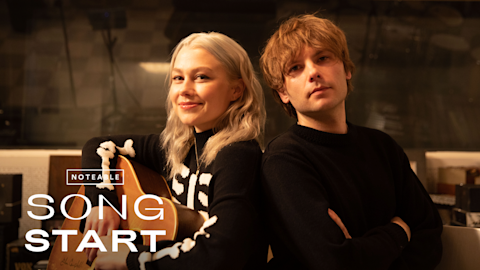The scariest thing about writer’s block is that it doesn’t usually manifest as just writer’s block. It involves an onslaught of self-doubt and anxiety: Am I really a songwriter? What if I never write another song ever again? Why is it that every time I go to write something, I find myself picking up whatever household cleaning product is available and maniacally scrubbing every surface of my apartment? How do I release myself from this Wikipedia rabbit hole I’ve dug myself, researching plant species indigenous to the Pacific Northwest?
There’s no need to worry. You will write again. Many artists go through dry spells, and in the most big-picture sense, it can be helpful to view them as periods of collecting information as you prepare to go back to writing. But if you’re antsy to mark up that blank piece of paper (or blank screen) in front of you, here are some tips that can shake things up a bit.
Just start.
In the realm of creative endeavors, there is no greater advice than “just start.” If it sounds really basic, that’s because it is.
Nick Cave has spoken about the artistic process as being needlessly mythologized, when it’s actually, in his words, “just hard labor.” Sitting down and beginning is sometimes the hardest part of that. Take comfort in his words here—it’s tough for rock stars, too.
“For me, songwriting is very, very difficult, and it doesn’t get easier,” Cave told The New Yorker in 2009. “You have to sit down and think about what you want and find a song. Some people find it really easy, but I don’t.”
Sometimes just getting that engine to turn over the first time is a huge hurdle, but even if you churn out 200 words of gibberish, you’ve unleashed something, and that something can be picked over, sculpted, pulled from, and even turned into something else entirely. Even if you use just four of those 200 words to seed the next thing, you’ve yielded results.
One of the easiest ways to “just start” every day is to have a routine that places you in the right spot—mentally and physically (more on that later). What time of day are you most productive? What type of environment encourages your best melody-making mood? Figure out what it is, and then fiercely protect that time and process for yourself.
Create or change up your space.
There are times when it closely resembles procrastination, but sometimes making sure that your environment is conducive to writing—the right view, good smells, some power-wielding talismans or good luck charms, whatever—can really help you feel like you’re ready to start once you sit down. Take it from Billy Joel, who in 1991, when asked about his routine at the Melbourne Music Festival, said, “I find that I like to have a view. I’ve gotten jaded and spoiled over the years. I have to have something that I like to look at, because there’s a lot of dead time in the writing process. If I’m not interested in sitting there and letting that dead time go by and staying with it, I won’t continue writing. So, I like to have a view of the ocean. I like to see the sea. It helps me a great deal.”
Write poetry, prose, a memoir, a piece of journalism—anything that isn’t a song.
Writing something that isn’t musical—and thus, not tied to a preconceived notion of what a song’s structure should be—can provide new perspectives that might be valuable. The exercise is worth your time just to get your brain working in different ways, but beyond that, you could find that the freeform poem you wrote can be twisted around notes in a way that could help you build a song in a way you never have before. A memory from your past might lead to a narrative tune. Working on an article about the neighborhood you live in might inspire you to lend your voice, via music, to your community.
Move your body.
Sometimes the best way to get creative juices flowing is to get your blood flowing. Science has long confirmed that exercise leads to better mental health, and better mental health includes stimulation of the parts of your brain that work on problem-solving (such as the problem of your writer’s block), and encourage divergent thinking. One of the qualities of divergent thinking is searching for possibilities that aren’t immediately obvious, and even creating possibilities, which makes it invaluable when trying to figure out how, say, the second verse of your next hit might start.
Diane Warren, who’s been nominated for ten Academy Awards for Best Original Song, says she takes time away from her desk. She told Inspirer in 2018, “I might get stuck on a song here and there, but I work through it. I walk away for a minute and let the song figure itself out.”
Exercise can be as simple as going for that minute-long walk—more oxygen means better brain function—or as complicated as climbing a mountain in the winter. Moving around can be great to solve a creative block, but there’s another thing: Frequently engaging in physical exercise will keep your mind sharp on the regular, according to Harvard Health.
Approach it like a sport, with writing exercises and maybe even teamwork.
Speaking of exercise, there’s also no shortage of writing exercises that can spark new ideas. A method that the writer William S. Burroughs made famous—and one that was adopted by R.E.M.’s Michael Stipe—is the cut-up technique, which involves cutting up a page of words from something like a newspaper or pamphlet or old book, and rearranging them until they tell a story or create an amusing scene.
It’s great to bring in your fellow songwriting pals for these sorts of activities, too. For example, Winnipeg psych-rockers The Waking Eyes used to have every member of the band compete to write the best song in what they called the four-hour challenge. They would have friends write ridiculous song titles on strips of paper, and each band member would draw a few out of a hat. Then, using a four-track recorder, each band member would have four hours alone to write and record a couple songs. In a similar spirit, there are also songwriting camps all over the world—like the Write On Song Camp at Atlantic Records, the Song City Song Camp in Nova Scotia, or the group of camps that started in Stockholm in 2015—that can help shake you out of your writer’s block by sticking you in a room with collaboratively minded songwriters and making you work until you’ve developed something.
Finally, you could try writing about something or someone that has nothing to do with you. During a Ted Talk in 2014, Sting told a story about overcoming a nasty case of writer’s block by looking to tell the stories of shipyard workers in the community he came from. “One of the first things I wrote was just a list of names of people I’d known [in that community], and they became characters in a kind of three-dimensional drama where they explained who they are, what they do, their hopes and their fears for the future,” he said. As soon as he began to work on telling the stories of other people, he said, the songs “came thick and fast. I’ve described it as a kind of projectile vomiting—a torrent of ideas, of characters, of voices.”
—Matt Williams






